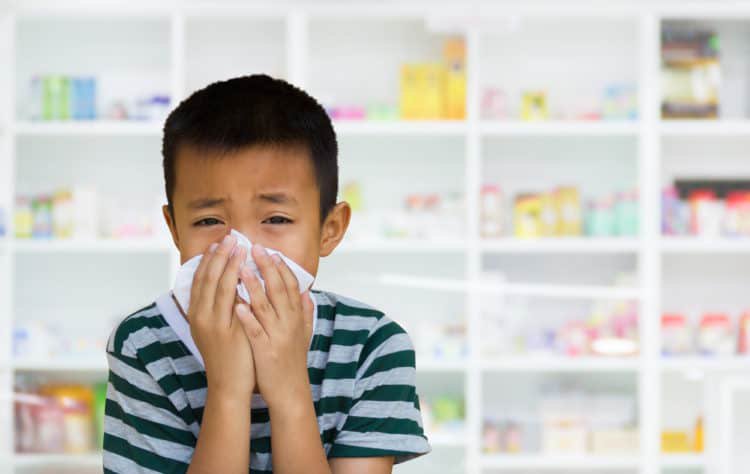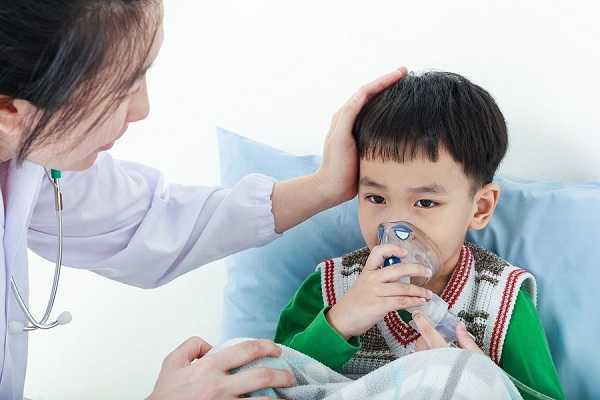Controlling allergic rhinitis in children
This is an automatically translated article.
The article was consulted with Specialist Doctor I, Resident Doctor Nguyen Hung Tien - Doctor of Pediatrics - Neonatology - Department of Pediatrics - Neonatology - Vinmec Hai Phong International General Hospital.
Although allergic rhinitis is not life-threatening, it makes children feel uncomfortable. Moreover, if not properly and definitively treated, the disease can cause many complications for children such as ear infections, sore throats, bronchitis,...
1. Causes of allergic rhinitis in children
Allergic rhinitis is a common disease in children, this is a condition in which the nasal mucosa is inflamed due to allergies to agents inside and outside the body. When exposed to allergens, the body releases histamine, which causes itching, swelling, and fluid buildup on the inside of the nose.
Causes of allergic rhinitis in children can be due to:
Environmental agents: the agents that cause allergic rhinitis in children exist in the environment, in the daily air source inhaled by the child, such as mites House dust, mold, cockroaches, pet dander, pollen particles, weeds, cosmetics, detergents,... cause irritation of the nasal cavity mucosa, creating conditions for allergic rhinitis to appear. presently. Risk factors: the child is inherently sensitive to allergens, the family has a parent with allergies or has a family history of allergies, the child is often exposed to the allergen, such as inhalation. must be house dust, dog and cat hair, pollen, cosmetics such as perfume, baby powder, scent from washing water, clothes conditioner. Anatomical abnormalities of the nasal cavity: Deformed septum, overgrowth of the nasal septum, overexpansion of VA arch, VA proboscis are also the causes of allergic rhinitis in children.
Causes of allergic rhinitis in children can be due to:
Environmental agents: the agents that cause allergic rhinitis in children exist in the environment, in the daily air source inhaled by the child, such as mites House dust, mold, cockroaches, pet dander, pollen particles, weeds, cosmetics, detergents,... cause irritation of the nasal cavity mucosa, creating conditions for allergic rhinitis to appear. presently. Risk factors: the child is inherently sensitive to allergens, the family has a parent with allergies or has a family history of allergies, the child is often exposed to the allergen, such as inhalation. must be house dust, dog and cat hair, pollen, cosmetics such as perfume, baby powder, scent from washing water, clothes conditioner. Anatomical abnormalities of the nasal cavity: Deformed septum, overgrowth of the nasal septum, overexpansion of VA arch, VA proboscis are also the causes of allergic rhinitis in children.

Có nhiều nguyên nhân khác nhau gây viêm mũi dị ứng cho trẻ nhỏ
2. Complications of allergic rhinitis
Allergic rhinitis in children will often show symptoms such as:
Sneezing, itchy nose, runny nose, clear water and stuffy nose. Allergic rhinitis in children is often accompanied by itchy, watery eyes (conjunctivitis in response to rhinitis). Although allergic rhinitis in children is not life-threatening, it can make children feel very uncomfortable. Moreover, if not properly and definitively treated, the disease can cause many complications for children such as:
Make them uncomfortable, lose sleep, reduce the ability to concentrate and remember, affect exploration of the world around as well as the ability to learn. Allergic rhinitis in children, if not treated well and promptly, can lead to diseases such as otitis media, sinusitis, then the treatment will be more difficult. About 40-50 % of children with allergic rhinitis can cause other allergic conditions such as asthma , or atopic dermatitis .
Sneezing, itchy nose, runny nose, clear water and stuffy nose. Allergic rhinitis in children is often accompanied by itchy, watery eyes (conjunctivitis in response to rhinitis). Although allergic rhinitis in children is not life-threatening, it can make children feel very uncomfortable. Moreover, if not properly and definitively treated, the disease can cause many complications for children such as:
Make them uncomfortable, lose sleep, reduce the ability to concentrate and remember, affect exploration of the world around as well as the ability to learn. Allergic rhinitis in children, if not treated well and promptly, can lead to diseases such as otitis media, sinusitis, then the treatment will be more difficult. About 40-50 % of children with allergic rhinitis can cause other allergic conditions such as asthma , or atopic dermatitis .

Hen suyễn là biến chứng của viêm mũi dị ứng
3. Care and treatment of allergic rhinitis
The goals of treatment for allergic rhinitis in children are to reduce symptoms to a minimum and to select drugs that are both effective and have few toxic side effects. However, when using, parents should pay attention to a few things: Some medicines for nasal congestion and runny nose containing Oxymethazoline or Xylomethazoline can only be used short for about 3-5 days only, if used for a long time will lead to a backlash that is aggravated nasal congestion. Some nasal sprays contain corticosteroids, which are the main drugs to treat allergic rhinitis in children, however, they need to be used under the guidance of a doctor to avoid side effects and be effective. In addition, it is necessary to find out the causes of allergies in children, to limit the children's exposure to the cause of allergies. If children have allergic rhinitis caused by flowers or animals, do not plant flowers near the house, do not allow dogs and cats in the house, do not leave children in environments with smoke, limit children to dusty, drafty, humid places. When washing the child's nose, parents should wash it with physiological saline (when using nasal spray devices, the spray heads must face outwards to avoid injuring the nasal septum). Conduct periodical cleaning of blankets, sheets, pillows, cushions, upholstery, to limit the existence and development of parasites. Keep the house cool, clean and avoid moisture to limit mold growth. Use appropriate masks for children when participating in traffic on the road to reduce the possibility of being affected by pollution in general and fine dust pollution in particular. Treatment of underlying diseases, if any, such as: gastroesophageal reflux disease, immunodeficiency ... Or abnormalities of nasal sinus anatomy if any.

Cha mẹ nên đưa trẻ đến gặp bác sĩ khi xuất hiện dấu hiệu bất thường
In case the symptoms of allergic rhinitis in children appear for a long time but the parents do not know the cause, they should take them to a hospital or a clinic specializing in paediatrics or allergies for the baby to be examined. Thoroughly, accurately diagnose the cause of the disease, screen for other possible allergic diseases and let the baby be properly diagnosed and treated according to the appropriate regimen. Avoid letting the disease get worse and progress to other respiratory diseases, affecting the child's ability to study and live and be difficult to treat in the future.
To prevent children from having allergic rhinitis, parents should also add some supportive foods containing lysine, essential micro-minerals and vitamins such as zinc, chromium, selenium, B vitamins,. .. helps meet the needs of nutrients while supporting the immune system, increasing resistance, reducing the risk of upper respiratory tract infections, bronchitis, flu.
To prevent children from having allergic rhinitis, parents should also add some supportive foods containing lysine, essential micro-minerals and vitamins such as zinc, chromium, selenium, B vitamins,. .. helps meet the needs of nutrients while supporting the immune system, increasing resistance, reducing the risk of upper respiratory tract infections, bronchitis, flu.
Please dial HOTLINE for more information or register for an appointment HERE. Download MyVinmec app to make appointments faster and to manage your bookings easily.
This article is written for readers from Sài Gòn, Hà Nội, Hồ Chí Minh, Phú Quốc, Nha Trang, Hạ Long, Hải Phòng, Đà Nẵng.





